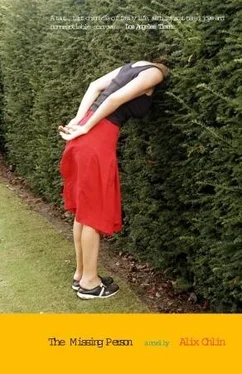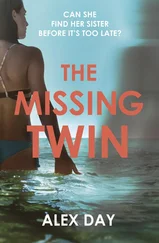Usually I didn’t make it much further than that. In my head Wylie was still a tousle-haired geek of around fourteen, camping out in a teepee in the backyard and building that science project where the volcano erupts. There was no way I could take him seriously. “Lynnie,” he wrote at the beginning of one of his messages, “I showed this section to Mom, and she said, ‘Have you ever thought about going to law school?’”
By the time I got to school it was past noon. Summer students with fluorescent hair and bad posture sat smoking on the concrete steps of the art building, where optimistic pigeons kept pecking at the discarded butts and dropping them, pecking and dropping, never learning their lesson. Inside, the hallways were almost empty, the classrooms silent and offices closed, my steps echoing against the linoleum. Bright shreds of posters on the bulletin boards publicized outdated events. I could hear a girl’s shrill giggle around a corner, fading as she walked away.
In Michael’s office there was yet another girl, this one young, very pretty, and Japanese, in a red miniskirt and matching high heels.
“But you don’t understand the pressure I’m under,” she was saying. “If I don’t get an A my parents will kill me, seriously kill me!”
“I have to admit that I doubt your life is in danger,” Michael said, his voice a low rumble, audibly amused.
“But everything will be ruined, and it will all be your fault! Who do you think you are?” the girl said, hysteria rising into her voice.
“It’s my job to grade your work.”
“You’re the teacher,” she said squeakily, “not God. ”
Michael’s voice dipped even lower, practiced and reconciling, soft as felt. I stepped into the doorway and coughed loudly. It was a little phlegmier, actually, than I’d meant it to be. The girl barely glanced up, but Michael smiled broadly, lines creasing deeply around his eyes, his looks as excellent as ever. He was my advisor. He was married. We’d flirted my first year in grad school, slept together my second, broken up my third. It was something he did; I knew this now.
“Lynn. Give me two minutes.”
I checked my mail in the department office, and by the time I came back the girl was promising to rewrite her paper over the course of the summer — making it the most “A-worthy” paper, she swore, he’d ever read — and away she went, tottering delicately on her heels.
“So,” he said. “How are you?”
“Good.” I sat down, pulling a pen and notebook out of my bag as if I expected a serious discussion, which I didn’t. The pages were filled with absurd scholarship in my messy handwriting, copied-out quotations from famous critics, notes on the sexual proclivities of obscure artists, reading lists of books I never consulted. It was a documented history of wasted time.
“How are you, really?”
“Really good.”
He smiled again. It seemed unfair that he was still so handsome. He crossed behind me and closed the door, then came back to face me. “I don’t suppose you have anything for me,” he said.
“You want gifts? If I’d known bribery would get me a degree, I wouldn’t have bothered to sleep with you.”
He didn’t laugh. He was wearing a dark blue T-shirt and black jeans and a silver bracelet on his left wrist which he twisted around and around while he looked at me. “A chapter. Part of a chapter. An abstract for a chapter. An idea. A glimmer of an idea that might eventually, in the fullness of time, become something more.”
“Oh,” I said. “I didn’t bring any of those.” I looked over his shoulder at the window. Students bent practically double under the weight of backpacks portaged across the quad. Rangy dark squirrels rummaged for snacks in the trees. As I watched, a gust of wind freed sheets of paper from the trash and skipped them like stones across the pavement.
“I am concerned,” Michael said softly, “about your progress in the program.”
“Yeah, well. . I guess it’s been kind of a slow semester.”
“It’s been a slow year, Lynn. You haven’t done anything, so far as I can tell, for at least a year. Quite possibly two. When are you going to take your exams? What’s going on with this?” He opened a file folder on his desk — my dossier, I guessed, wondering what other information he kept in there — and held up a piece of paper, my supposed abstract of my supposed research for my supposed dissertation. We’d written it together one night in bed in my apartment, the laptop battery toasting my thigh, Michael’s arms circling me from behind, his index fingers tapping with aggravating slowness on the keys. The abstract, and his endorsement of it, had gotten me the year of fellowship support I was living on now. I could tell that he was going to read it out loud.
“Please don’t start reading it out loud,” I said.
He peered at it as if he hadn’t written it. “The Secret Modernists: Cultural Production and Practice in Women Artists, 1965 to 1980.” He looked up. “Have you looked at those Eleanor Antin papers I was telling you about? Did you go to Philadelphia to see that show?” Then, after I didn’t answer: “You know, Lynn, I’ve always thought this was an excellent topic. You have an opportunity here to do something potentially explosive. But if you sit on it for too long, somebody else will beat you to it.”
I’d heard this speech before, though I couldn’t remember where the idea had even come from originally, whether it was mine or his. The dissertation supposedly would re-evaluate the feminist art movement in modernist terms, arguing that even though the artists themselves rejected traditional barometers of quality, the work itself could nonetheless be evaluated and prized according to those terms. It was the perfect approach, Michael once said, one that dismantled previous criticism while elevating provocative work; it could push buttons, make enemies, resurrect careers. And, if nothing else, I did like the art of that period, which was populated by high-concept performances and fervent politics, women parading around naked in galleries, issuing manifestos, painting with their menstrual blood. I liked the physical and emotional extremity of it, the willingness of the artists to put their blood and guts, their pain and pleasure, on full display. My dissertation was going to make the case for the aesthetic value of this art, as opposed to its historical significance; I would use my skills as an art historian to situate this work in a broader context and, at the same time, situate myself in the job market. That was Michael’s plan, and clear enough to me; I just hadn’t gotten around to following it.
He was watching me, and I shrugged. His computer hummed its same monotonous song, and his office smelled of the pear soap he used at home. I didn’t say anything. His area was contemporary art, his office littered with catalogs and announcements and letters and slides. He wrote for all the magazines and went to all the shows. That first year in graduate school, I believed that he was going to teach me something important, not only about art but also about how to live in the world as a sophisticated person. I’d felt my life, and myself, changing under his gaze. But it didn’t last.
“Your grant runs through the end of the summer,” Michael said. “You can take these next few months and then — well, make up your mind. Decide whether you’re going to put out or get out.”
“Not to criticize,” I said, “but do you think that’s the best choice of words?”
He sighed. “Look, Lynn, you might not believe this, but I’m only trying to help.”
“Oh, you’re a big help,” I said. “You’re massive. You’re huge. ”
I could barely hear him saying good-bye as I walked out of the office and down the hall. All professors sleep with students, and then with other ones, and nobody is surprised. I wasn’t surprised myself. It was amazing how unhelpful, in the end, lack of surprise could be.
Читать дальше












